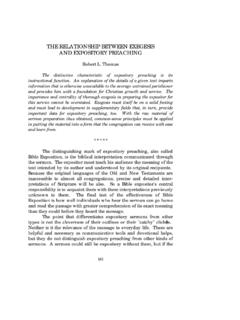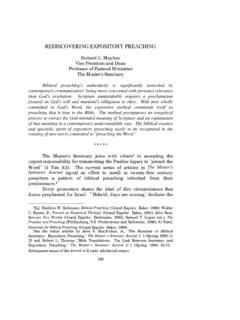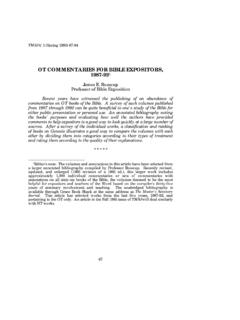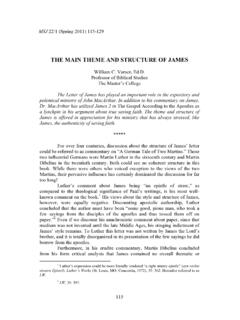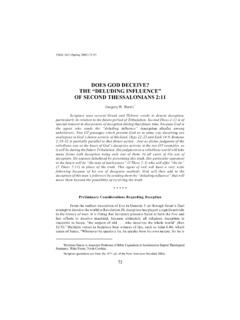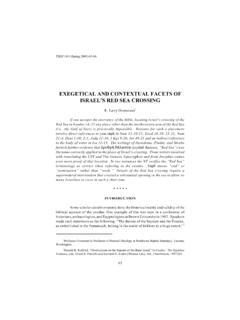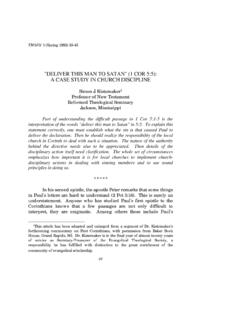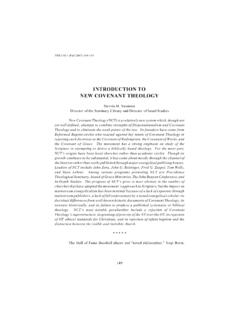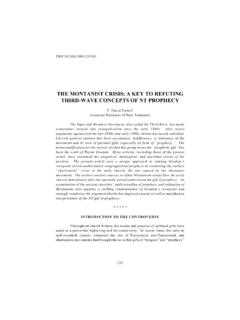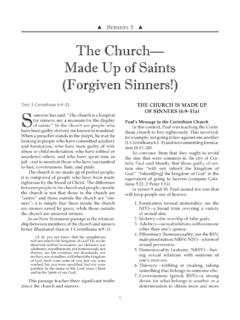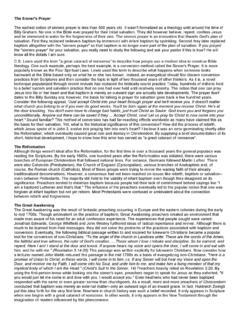Transcription of SANCTIFICATION AND JUSTIFICATION: A UNITY OF DISTINCTIONS
1 MSJ 21/2 (Fall 2010) 00-00 SANCTIFICATION AND JUSTIFICATION: A UNITY OF DISTINCTIONSA ndrew V. SniderAssistant Professor of TheologyThe task at hand is to relate justification (being declared righteous) to abiblical understanding of SANCTIFICATION (being made righteous). When God declaresa sinner as righteous, the action begins with His own character and is accomplishedby His own action. All His ways are perfect, just, and upright, qualities that stemfrom His holiness. His redemptive acts, including His justification of sinners , aremarked by His love as exemplified in Rom 8:31-39. justification is a declaration byGod of the sinner s status before Himself, imputing to him the righteousness ofChrist through faith. Holiness is the key concept of SANCTIFICATION as seen in theconsistent biblical emphasis on God s people being a holy people.
2 Positionalsanctification is a determination by God that a sinner is set apart as a member ofGod s holy people. Progressive SANCTIFICATION speaks of a growth in practicalholiness when believers obey God s command to grow in Christlikeness. Under-standing the correct relationship between justification and progressive sanctifica-tion is important: SANCTIFICATION does not cause justification and justification doesnot cause SANCTIFICATION . Yet there is great importance in seeing that the two arisefrom the same soteriological reality of Christ s substitutionary atonement and theresultant union of the believer with Christ.* * * * *IntroductionThe doctrine of justification has been the topic of a tsunami of literature inrecent decades. There are new and fresh perspectives, and yet still many whoseek to defend the traditional Reformation formulation.
3 The famous words of Luther(it is the article of the standing or falling of the church ) and Calvin (it is the mainhinge on which religion turns ) have become aphorisms of the traditional view. Thedizzying array of arguments and counterproposals can seem impenetrable to the12 The Master s Seminary Journaluninitiated. Indeed, one could be forgiven for wanting to skip past yet another1article on this well-traversed , the following study will not enter into that discussion. Rather, itwill be its task to relate justification (according to the old perspective) to a biblicalunderstanding of SANCTIFICATION , a topic which has had less direct treatment of late,as attention has turned to related matters of spirituality or spiritual formation. 2 Since the reformers first carefully distinguished between being declaredrighteous and being made righteous, comparing and contrasting justification andsanctification has been considered a key element in expressing the gospel can be seen particularly in Calvin, who considered this distinction at study, after first summarizing the basics of justification and sanctifica-tion, will seek to avoid two extremes in relating these key doctrinal themes.
4 First isthe tendency to conflate them so that they are nearly identified the idea thatsanctification causes justification or growth therein, or the less serious error ofseeing justification as the cause of SANCTIFICATION . The second and opposite error isto separate them so widely that their soteriological connection is asserted barely andwithout adequate theological argument. Such misses a key biblical on an array of biblical texts and Calvin s concept of twofold grace will show that justification and SANCTIFICATION are distinct aspects of the gift ofsalvation related to each other because they both flow from the atonement and abeliever s union with : The BasicsJustification is a legal term that is used in the NT to describe how a sinnerPeter Toon projected in 1983 that what is likely to happen in the near future is a general1consensus among biblical scholars of all kinds as to the meaning of righteousness and justification in theBible, especially in the Pauline letters (Peter Toon, justification and SANCTIFICATION [Westchester, Ill.)]
5 :Crossway, 1983] 140). The intervening years have shown his well-intentioned and enviable optimismto be profoundly in this field is even more diffuse than on justification . Though it will not be the goal of2this study to sort out spirituality from spiritual formation and relate both to SANCTIFICATION , that wouldbe a worthwhile effort. Brian Colmery has made some strides in this direction ( True Spirituality: InPursuit of an Evangelical Spiritual Theology [ thesis, The Master s Seminary, 2010]).Key discussions of this point in Calvin s soteriology include Cornelis P. Venema, Calvin s3 Understanding of the Twofold Grace of God and Contemporary Ecumenical Discussion of the Gospel, MJT 18 (2007):67-105; Jonathan Rainbow, Double Grace: John Calvin s View of the Relationship ofJustification and SANCTIFICATION , Ex Auditu 5 (1999):99-105; and Anthony N.
6 S. Lane, TwofoldRighteousness: A Key to the Doctrine of justification ? in justification : What s at Stake in the CurrentDebates, eds. Mark Husbands and Daniel Treier (Downers Grove, Ill.: InterVarsity, 2004) and justification : A UNITY of DISTINCTIONS 3is made acceptable to God. In salvation, God declares a sinner to be righteous a4consideration that begins in His own character and is accomplished by His It Starts: the Character of GodIt is not unusual to begin a discussion of justification with sin the problemthat justification is intended to overcome. This is certainly not inappropriate, but5since justification is an act of God, it seems at least as appropriate to begin thediscussion with the attributes of God which motivate this action. For whenconsidering any of God s actions, it is important to take seriously the principle thatall of God s acts flow first of all from His purposes and His , since justification involves declaring a sinner to be right with God( , righteous) and therefore acceptable to Him, justification is an act performed bya righteous and just God.
7 Repeatedly in the OT, God is honored as the one who isentirely and quintessentially righteous. This means that all his ways are perfect, just,faithful, and upright (Deut 32:4; Ps 145:17). Another approach is to see God s ethical righteousness as the outworkingof His holiness. Because God is wholly other, His actions manifest the otherness of6 His being as absolute moral purity. Strong puts it as follows:Holiness in God must, consequently, be defined as conformity to his own perfect only rule for divine will is divine reason; and divine reason prescribes everythingthat it is befitting an infinite being to do. God is not under law or above law he is is righteous by nature and of Or, as Culver has more recently expressed it, The righteousness by which Godorders His world is neither something created, external to Himself, nor somethingAs noted above, the purpose of this article is not to defend assertions such as this against the more4recent formulations of justification .
8 Although the discussion continues, this writer considers suchformulations to have been substantially answered in such varied works as D. A. Carson, Peter T. O Brien,and Mark A. Seifrid, eds., justification and Variegated Nomism: A Fresh Appraisal of Paul and SecondTemple Judaism, 2 vols. (Grand Rapids: Baker, 2001 and 2004); Guy Prentiss Waters, justification andthe New Perspectives on Paul (Philipsburg, : P & R Publishing, 2004); John Piper, The Future ofJustification: A Response to N. T. Wright (Wheaton, Ill.: Crossway, 2007), and recent example is Guy Prentiss Waters, justification Defined, Churchman 123/1 (Spring52009):67-81. See also Bruce Demarest s similar starting point in The Cross and Salvation (Wheaton,Ill.: Crossway, 1997) example, A. H. Strong, Systematic Theology: A Compendium, 3 vols.
9 In one (Old Tappan, : Fleming H. Revell, 1907) 272; William G. T. Shedd, Dogmatic Theology, 3rd ed., ed. Alan (Phillipsburg, : P & R, 2003) , Dogmatic 291. [Andy, should this be Shedd instead of Strong?]74 The Master s Seminary Journalother than God Himself in any manner whatsoever. His righteous acts are Hischaracter in action; God is law unto Himself. So God is righteous in that everything8He thinks, says, and does, and is perfectly consistent with His own character for he cannot deny himself (2 Tim 2:13).9 The rendering of consistent and sound justice is also a key aspect of God srighteousness God always treats others rightly. As the rightful Sovereign of theworld, righteousness and justice are the foundation of [his] throne (Ps 89:14; 119:137-8).
10 This is the normative side of God s righteousness His character isnot just the standard for His own thoughts and actions, but is also the yardstick forall His moral creatures. This principle is found in its simplest and most explicit formin the command, Be holy for I am holy (Lev 11:44), an imperative that isemphatically reiterated for the church in 1 Pet 1 s own righteousness, then, is the standard for all God s moralcreatures. And because YHWH himself is righteous, He loves expressions of thisuprightness and moral rectitude in the attitudes and actions of his creatures. Thepsalmist says that YHWH is righteous; he loves righteous deeds; the upright shallbehold his face (Ps 11:7). The problem for humankind, of course, is that there isno one who does good (Ps 14:1), not even a single person (Rom 3:10-12).
